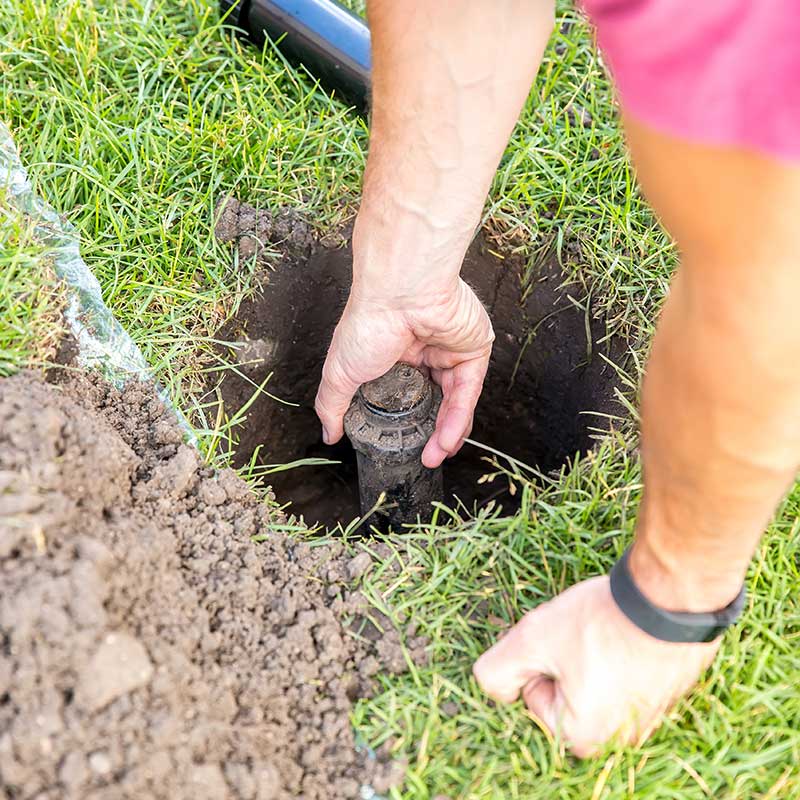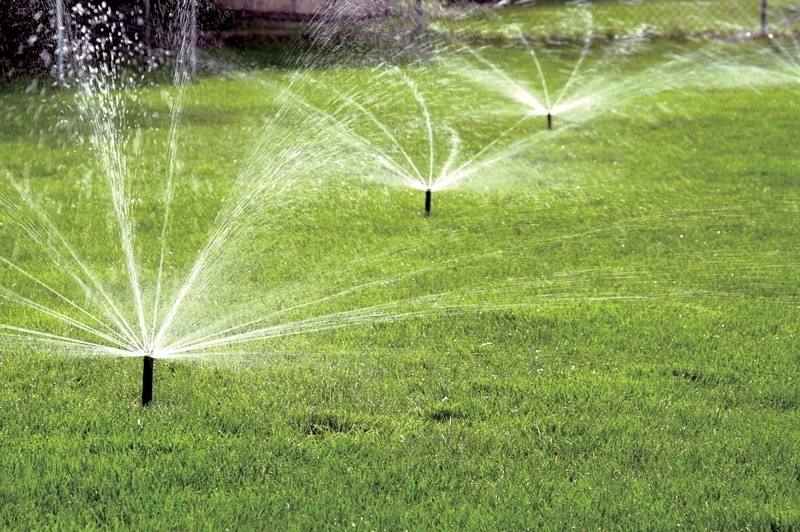The Advantages of an Automatic Sprinkler: Enhancing Your Watering Strategy for Healthier Plants
A lawn sprinkler provides countless advantages that can considerably improve irrigation techniques. It guarantees constant watering, which is important for optimal plant development. Automation reduces the time and labor associated with hands-on watering. Furthermore, these systems can be customized to meet specific landscape needs. Nevertheless, the advantages expand past mere comfort. Comprehending exactly how an automatic sprinkler can improve overall landscape wellness can bring about more vivid and durable yards. The effects deserve exploring additionally.
Regular Watering for Optimum Plant Growth
When taking into consideration the health of a yard, regular watering plays an important role in promoting optimal plant development. Ample hydration warranties that plants obtain the essential wetness for photosynthesis, nutrient uptake, and general vigor. Irregular watering can result in tension, triggering plants to endure or shrivel from stunted development.
A properly designed lawn sprinkler assists in consistent circulation of water, protecting against over-saturation in some areas while leaving others blistered. By keeping a constant wetness level, plants create robust root systems, boosting their resilience against conditions and bugs. Regular watering timetables can be adjusted according to seasonal adjustments, enabling for perfect hydration throughout the year. irrigation system repair.
Eventually, constant watering through a reliable sprinkler system not just supports healthy and balanced plant advancement yet likewise urges lush vegetation and dynamic blossoms, adding to a thriving garden ecosystem.
Time and Labor Cost Savings
A well-installed lawn sprinkler system provides considerable time and labor savings for garden upkeep. By automating the watering procedure, property owners can remove the need for hands-on watering, which typically requires substantial time and effort. This automation enables garden enthusiasts to concentrate on other necessary tasks, such as planting, weeding, and harvesting, instead than spending long hours sprinkling their plants.
Sprinkler systems can be configured to run throughout ideal times, guaranteeing that plants obtain sufficient wetness without the demand for consistent supervision. This reduces the possibility of over- or under-watering, causing much healthier plants and much less squandered effort. Furthermore, the system can be tailored to certain garden zones, making sure that each location gets the proper quantity of water without needing different watering routines. Eventually, the time and labor savings afforded by a sprinkler system contribute to a more efficient and satisfying horticulture experience.
Water Conservation and Effectiveness
Traditional watering methods can lead to substantial water waste, a properly designed lawn sprinkler system improves water conservation and performance. Lawn sprinkler provide water directly to the origin areas of plants, reducing evaporation and runoff. This targeted strategy warranties that plants obtain the precise quantity of water they need, advertising healthier growth while lowering water usage overall.
Contemporary lawn sprinkler systems commonly come geared up with timers and dampness sensors that readjust watering timetables based on ecological problems. This innovation prevents overwatering throughout stormy periods and preserves water during completely dry spells. Additionally, by covering a bigger location uniformly, these systems remove the need for too much manual watering, which can be wasteful and irregular.
Incorporating an automatic sprinkler into an irrigation approach not only supports lasting horticulture practices however additionally contributes to substantial water cost savings, making it a smart financial investment for ecologically aware gardeners.
Adjustable Watering Solutions
Personalized irrigation options provide adaptability that allows gardeners to tailor their watering systems to fulfill the details needs of their landscapes. These systems can be readjusted concerning timing, duration, and regularity of watering, making certain suitable moisture degrees for various plant types. By integrating soil wetness sensing units, garden enthusiasts can better refine their irrigation routines based on real-time data, protecting against overwatering and promoting healthier root development.
Furthermore, adjustable choices allow the combination of different sprinkler types, such as drip systems or rotating nozzles, which satisfy distinct garden layouts and plant requirements. This flexibility not just boosts plant wellness however likewise saves water resources by directing moisture precisely where it is required most. Overall, customizable watering options encourage garden enthusiasts to develop effective, efficient sprinkling techniques that foster vibrant, growing landscapes.
Boosted Landscape Aesthetic Appeals
Efficient irrigation solutions not just advertise plant wellness however also greatly boost landscape looks. A well-designed automatic sprinkler assures that plants get constant moisture, resulting in vibrant shades and rich growth. This consistent watering stops dry spots and motivates an even distribution of greenery, making landscapes appear even more natural and welcoming.
Lawn sprinkler systems can be purposefully put to highlight details functions, such as blossom beds, trees, or ornamental lawns, boosting the visual allure of outdoor areas. The capability to automate watering timetables permits a properly maintained appearance with marginal initiative, freeing house owners from the manual work of irrigation.

Raised Property Worth
Spending in a lawn sprinkler commonly translates to a boost in building value, as prospective purchasers identify the benefits of a well-kept landscape. Properties geared up with reliable watering systems tend to appear a lot more appealing, showcasing lavish plant and vibrant flower beds. This aesthetic allure not just enhances curb charm yet additionally signals to buyers that the residential property has been cared for and maintained.
Moreover, a lawn sprinkler adds to the total ease of landscaping upkeep, allowing homeowners to spend less time on hands-on watering and even more time enjoying their outside areas. The ease used by automated irrigation can be a substantial selling factor, interesting hectic families and people.
Eventually, buildings including sprinkler systems might regulate higher list price and attract even more possible purchasers, making it a smart investment for those looking to boost both their living setting and property value.

Often Asked Concerns
Exactly how Do I Select the Right Automatic Sprinkler for My Garden?
To select the best sprinkler system for a garden, one must consider yard size, plant types, water pressure, and climate. Investigating various systems and consulting neighborhood gardening professionals can also supply beneficial understandings and recommendations.
Can I Install an Automatic Sprinkler Myself?
Yes, a person can set up an automatic sprinkler themselves. It requires cautious planning, expertise of watering techniques, and enough tools. Correct study and preparation can bring about a successful DIY installment.
How Commonly Should I Run My Sprinkler System?
An automatic sprinkler must commonly run 2 to 3 times weekly, depending upon weather conditions and plant requirements. It's vital to readjust frequency based upon rainfall and seasonal adjustments for suitable plant health.
What Upkeep Does an Automatic Sprinkler Need?

Are There Eco-Friendly Lawn Sprinkler Options Available?
Yes, green sprinkler alternatives are offered. These systems often use drip irrigation, rainfall sensors, and wise here technology to enhance water usage, decreasing waste and advertising lasting practices while making certain plants get ample hydration.
Sprinkler systems can be set to run during excellent times, guaranteeing that plants obtain sufficient wetness without the demand for constant guidance. Lawn sprinkler systems deliver water straight to the root zones of plants, lessening dissipation and runoff. To select the appropriate sprinkler system for a yard, one need to consider garden size, plant types, water stress, and climate. A lawn sprinkler system should usually run 2 to 3 times per week, depending on weather conditions and plant requirements. A lawn sprinkler system calls for regular maintenance, including inspecting for leaks, changing lawn sprinkler heads, cleansing filters, inspecting timers, and winterizing in colder months.